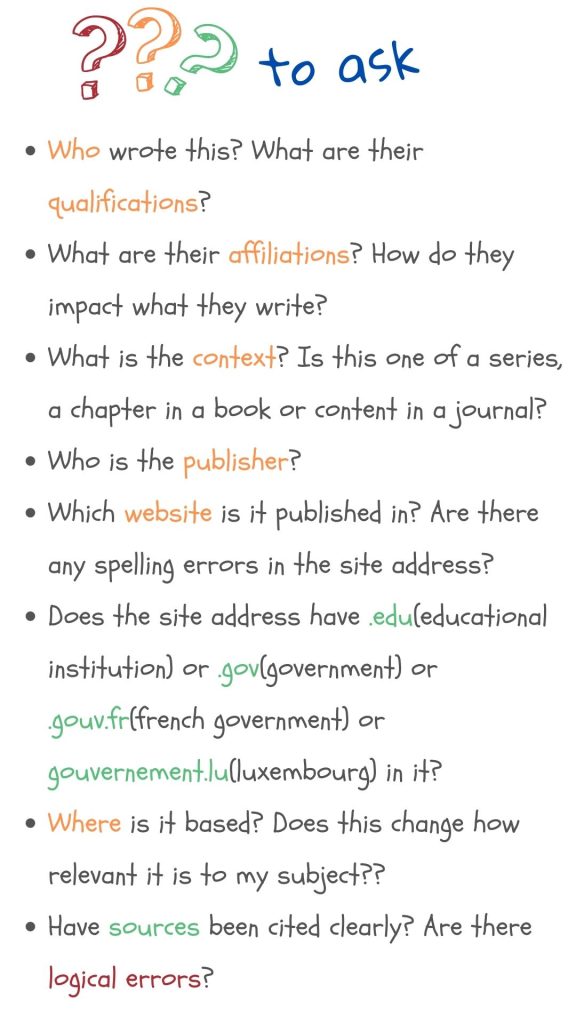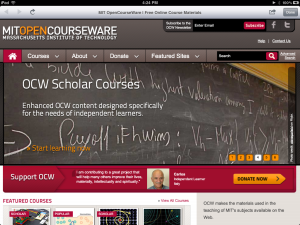Finding Information
8 Search Engines Part 2
Authenticity and Relevance
We have been taught to have confidence in books. Publishers, librarians, professors and subject-matter specialists act as gatekeepers to printed resources. They make sure the resource is authentic and of good quality. How to find, and make sure the students find, appropriate sources when it comes to the web1,2?
 Even printed material from good sources have been proven to be full of errors and biases. Perhaps nurturing the culture of critical evaluation would reap benefits beyond choosing good online sources2.
Even printed material from good sources have been proven to be full of errors and biases. Perhaps nurturing the culture of critical evaluation would reap benefits beyond choosing good online sources2.
Digital Repositories

One good way to ensure content stays authentic is to use digital collections from known and trusted sources. These can vary from school-level to global resources. Over the past two decades, the number of digital libraries has increased dramatically, allowing educators to access and use documents such as data sets, maps and images3.
To find information, you can use either search inside the corresponding web site or using site: keyword in a search engine.
Even Google has specific search engines for
– public datasets, where governments, public institutions, and large corporations make their collected data available for the public. It is all public information collected from studies, surveys, and censuses4.
– research articles, where millions of papers and books, both open access and fee based, are indexed and ready for search.
Open courseware from universities, Khan Academy and online encyclopedias are all popular sources of information.
Volatile content
Search engines are constantly testing new algorithms. Mobile search differs from desktop search since it tends to favour results that are tied to current location4.
Every day, new content is indexed, while old content is indexed in a different way. New data is created from old data by re-analysing content1. Copyrights and licences change. Laws concerning data change too, chronologically and in terms of location. For example, within the European Union, due to GDPR, search engines continue to list content to which index has been removed. Even maps change, depending on where they are accessed from. Language and its usage changes. Both the use of medical categories and their interpretation vary from country to country1.
Not to forget that search results are ranked according to the history of user activity, their personal information and privacy settings. Thus all of us have access to different content and might not even be able to find the same content twice. All these differences have to be taken into account while setting and grading educational activities.
Other challenges
Search engines bring in other changes too. Knowledge is easily available. We don’t have to know facts any more. Instead, we try to remember where and how to find it1. Programmers cut and paste snippets of code. Engineers run simulators. There are forums for both homework questions and teacher complaints. Skill is becoming more important than knowledge and memory. Even our views on ethics and morality change – how do we explain plagiarism to the copy-and-paste generation?
1 Russell, D., What Do You Need to Know to Use a Search Engine? Why We Still Need to Teach Research Skills, AI Magazine, 36(4), 2015.
2 Marion Walton, M., Archer, A., The Web and information literacy: scaffolding the use of web sources in a project-based curriculum, British Journal of Educational Technology, Vol 35 No 2, 2004.
3 Land, S., Hannafin, M. J., & Oliver, K. Student-Centered Learning Environments: Foundations, Assumptions and Design. In Jonassen, D. H. & Land, S. (Ed.), Theoretical foundations of learning environments (pp. 3–26), Routledge, 2012.
4 Spencer, Stephan. Google Power Search: The Essential Guide to Finding Anything Online With Google, Koshkonong. Kindle Edition.
